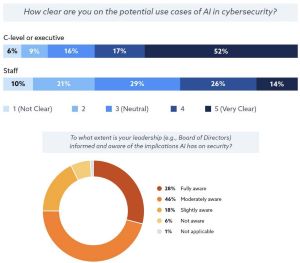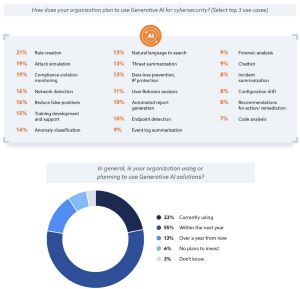Security Professionals Express Cautious Optimism About AI
C-Suite Executives Have Different AI Perspectives from Their Staff
 [Click on image for larger view.](source: CSA).
[Click on image for larger view.](source: CSA).
- Discrepancy in AI Familiarity: 52% of C-suite executives report being very familiar with AI, versus 11% of staff.
- Understanding of AI Use Cases: 51% of C-levels have a clear understanding, compared to 14% of staff, suggesting a knowledge gap or overestimation of familiarity by executives.
- Leadership Awareness: 74% believe their leadership is informed about AI's implications on security.
- AI Adoption Push: 82% note executive leadership and boards are advocating for AI adoption, indicating top-down pressure.
- Need for Enhanced Communication: Highlights the importance of improved education and collaborative approaches to AI implementation in cybersecurity.
2024 Is the Year for AI Implementation — Get Ready for the Revolution
 [Click on image for larger view.](source: CSA).
[Click on image for larger view.](source: CSA).
- Over half (55%) of organizations are planning to implement gen AI solutions in the next year
- A diverse range of use cases are being explored with the top use cases: rule creation (21%), attack simulation (19%), and compliance violation detection (19%)
- Biggest hurdle to AI implementation is the skills gap and staff shortage, as reported by 33% of respondents.
"The advent of artificial intelligence (AI) in cybersecurity marks a transformative era in the realm of digital defense. AI has the potential to be a vital ally for bolstering security defenses, identifying emerging threats, and facilitating swift responses. However, the journey towards integrating AI into security workflows is fraught with obstacles, including the need to mitigate dual-use concerns, bridge skill gaps, and encourage appropriate reliance on automated systems," the report said.
About the Author
David Ramel is an editor and writer at Converge 360.